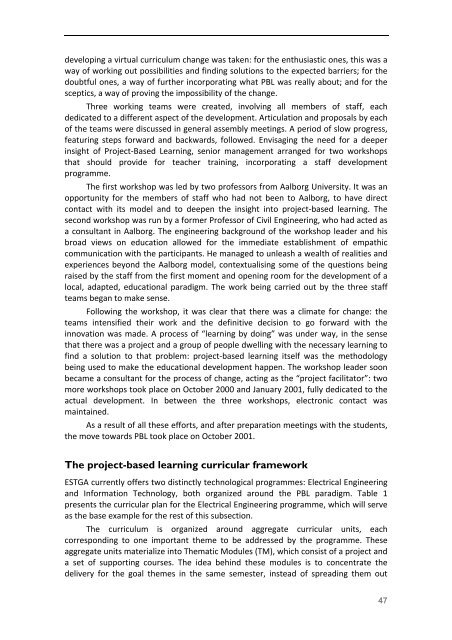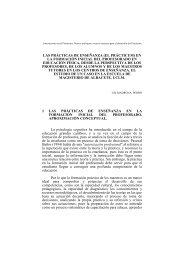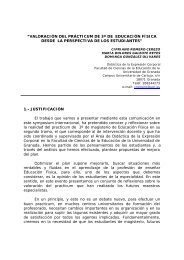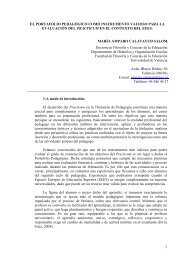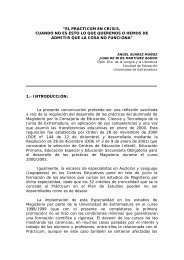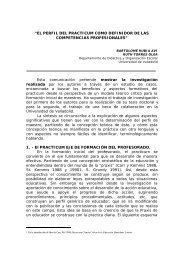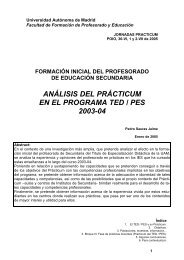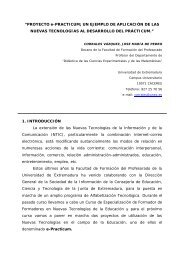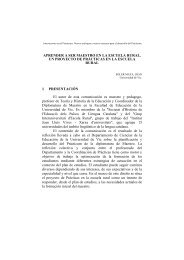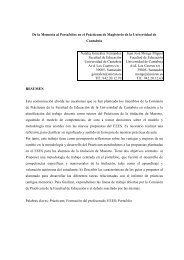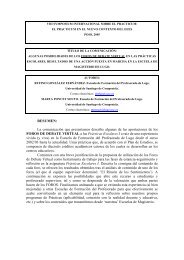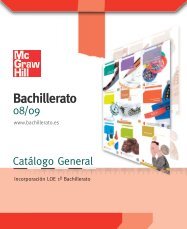descarga completa del vol. 9 nº 1 - REDU. Revista de Docencia ...
descarga completa del vol. 9 nº 1 - REDU. Revista de Docencia ...
descarga completa del vol. 9 nº 1 - REDU. Revista de Docencia ...
You also want an ePaper? Increase the reach of your titles
YUMPU automatically turns print PDFs into web optimized ePapers that Google loves.
<strong>de</strong>veloping a virtual curriculum change was taken: for the enthusiastic ones, this was away of working out possibilities and finding solutions to the expected barriers; for thedoubtful ones, a way of further incorporating what PBL was really about; and for thesceptics, a way of proving the impossibility of the change.Three working teams were created, in<strong>vol</strong>ving all members of staff, each<strong>de</strong>dicated to a different aspect of the <strong>de</strong>velopment. Articulation and proposals by eachof the teams were discussed in general assembly meetings. A period of slow progress,featuring steps forward and backwards, followed. Envisaging the need for a <strong>de</strong>eperinsight of Project‐Based Learning, senior management arranged for two workshopsthat should provi<strong>de</strong> for teacher training, incorporating a staff <strong>de</strong>velopmentprogramme.The first workshop was led by two professors from Aalborg University. It was anopportunity for the members of staff who had not been to Aalborg, to have directcontact with its mo<strong><strong>de</strong>l</strong> and to <strong>de</strong>epen the insight into project‐based learning. Thesecond workshop was run by a former Professor of Civil Engineering, who had acted asa consultant in Aalborg. The engineering background of the workshop lea<strong>de</strong>r and hisbroad views on education allowed for the immediate establishment of empathiccommunication with the participants. He managed to unleash a wealth of realities an<strong>de</strong>xperiences beyond the Aalborg mo<strong><strong>de</strong>l</strong>, contextualising some of the questions beingraised by the staff from the first moment and opening room for the <strong>de</strong>velopment of alocal, adapted, educational paradigm. The work being carried out by the three staffteams began to make sense.Following the workshop, it was clear that there was a climate for change: theteams intensified their work and the <strong>de</strong>finitive <strong>de</strong>cision to go forward with theinnovation was ma<strong>de</strong>. A process of “learning by doing” was un<strong>de</strong>r way, in the sensethat there was a project and a group of people dwelling with the necessary learning tofind a solution to that problem: project‐based learning itself was the methodologybeing used to make the educational <strong>de</strong>velopment happen. The workshop lea<strong>de</strong>r soonbecame a consultant for the process of change, acting as the “project facilitator”: twomore workshops took place on October 2000 and January 2001, fully <strong>de</strong>dicated to theactual <strong>de</strong>velopment. In between the three workshops, electronic contact wasmaintained.As a result of all these efforts, and after preparation meetings with the stu<strong>de</strong>nts,the move towards PBL took place on October 2001.The project-based learning curricular frameworkESTGA currently offers two distinctly technological programmes: Electrical Engineeringand Information Technology, both organized around the PBL paradigm. Table 1presents the curricular plan for the Electrical Engineering programme, which will serveas the base example for the rest of this subsection.The curriculum is organized around aggregate curricular units, eachcorresponding to one important theme to be addressed by the programme. Theseaggregate units materialize into Thematic Modules (TM), which consist of a project anda set of supporting courses. The i<strong>de</strong>a behind these modules is to concentrate the<strong><strong>de</strong>l</strong>ivery for the goal themes in the same semester, instead of spreading them out47


